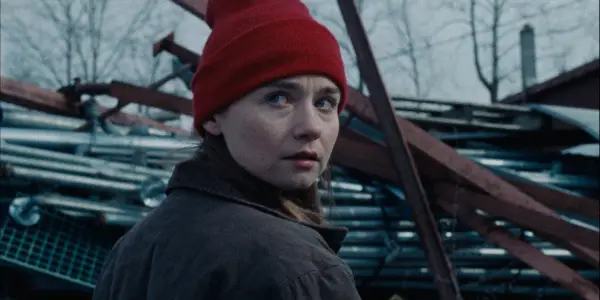While survival and transitional stories are far from a new tale, their ability to interweave important topics and necessary conversations of the world into the narrative is what keeps them fresh and relevant. It is their ability to stay true to the issues through strong characters and solid setting that maintains their importance throughout the history of cinema. In 2020, director Nicole Riegel brings us Holler.
Originally slated to premiere at SXSW, Holler has patiently waited in the wings, the story of a young women’s fight for the right to education just as relevant as ever before. There is a rare nature and rough surface to Holler that will resonate with audiences, the need for survival, perseverance, and opportunity elements that we have all faced at one time or another.
A Tale of Choice, Survival, and Opportunity
Opening to a young woman running down the street, bags of aluminum cans in her hands, the fear of being caught pushing her every step, immediately sets the framework for not only the film but for the setting it is to take place in. There is a forgotten feeling, drab grey skies reflecting on a town unknown to the rest of the country. As Trump’s voice is heard over the radio, his promise of “jobs, jobs, jobs” is swiftly contrasted to the actual state of the town and its reliance on the factory for income, community, and stability. This is a town struggling to survive, yet resolved to its fate.
It’s breathtaking how quickly this setting is crafted and then immediately contrasted by the quiet brilliance of Ruth (Jessica Barden). While she is introduced as a quiet and reserved young woman, she is always watching, listening – analyzing. She is both brilliant and independent, scenes of Ruth in her kitchen picking up and doing school work for others, accompanied by “Ruth’s theme” from composer Gene Back, proves that a showcase in character depth is not just in the dialogue.

Bringing Holler to Life
Through the majesty of the metal and mood of the palette, both are starkly contrasted by a red beanie that Ruth sports thought out a majority of Holler. It is a beacon, keeping your eyes locked on Ruth. Driving home the understanding that she is different than the town than those around her. She has a shine that needs to be given room to not only grow but encouragement to be brave enough to do so. There is a depth in this one pop of color that quietly exists in front of viewers, finding its own evolution and growth of meaning as the film progresses.
With the focus still centralized on Ruth, the town, the factory, the lifestyle, and the struggles each become their own supporting characters. These are struggles and loses Ruth has not only witnessed but felt herself. These are the supporting characters that are not only pushing her to want more for herself but also tethering her in place.
With all this in mind, Holler finds its cohesive completion through the engulfing score from composer Gene Back. It is pensive, yet hopeful and optimistic. The strings fill the screen, pushing the rhythm of the film, Ruth, and the story forward.
Education and Opportunity
Branching off the dissuading of further education and opportunity, Holler also gives a nod to the failings of the justice system as well. Beyond just Ruth’s arrest for stealing a book, her mother, a recovering drug addict (whose addiction spawned from a work accident) is kept at the county jail to get clean. There is little empathy shown to her mother’s position and how she got there, only that she is part of a cycle of addiction, criminality, and stereotypical expectations. The idea that the heavy hand of justice shows little mercy even on young as they are discovering themselves and those who suffer from battles and are struggling to win is a sad and harsh spotlight America finds itself under.
Conclusion: Holler
We need more stories like Holler, films unafraid to push the spotlight on the failures and shortcomings of our country and community placed on the youth – on the future. And not only the youth, but those who strive to just make it through each day.
Does content like this matter to you?
Become a Member and support film journalism. Unlock access to all of Film Inquiry`s great articles. Join a community of like-minded readers who are passionate about cinema - get access to our private members Network, give back to independent filmmakers, and more.